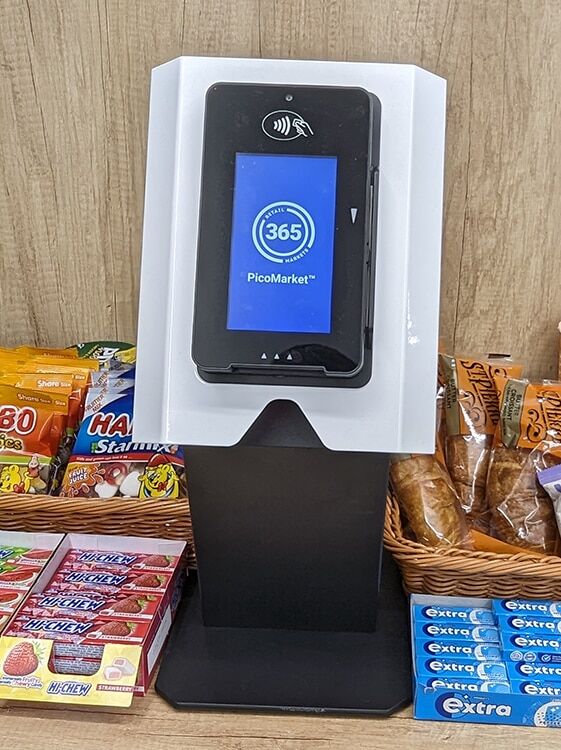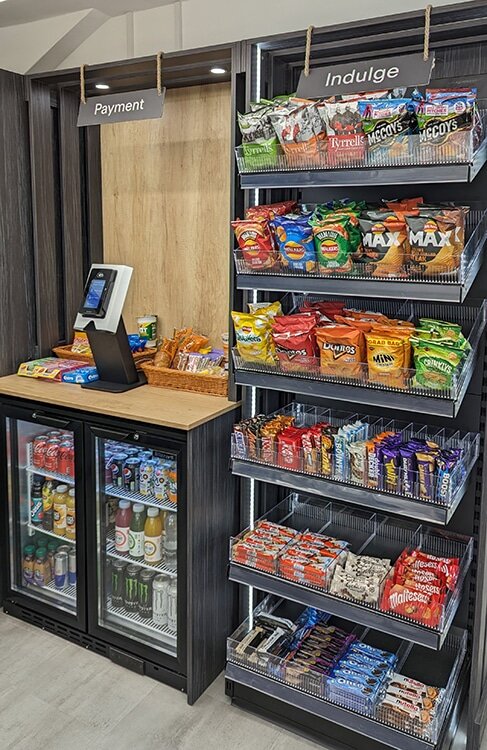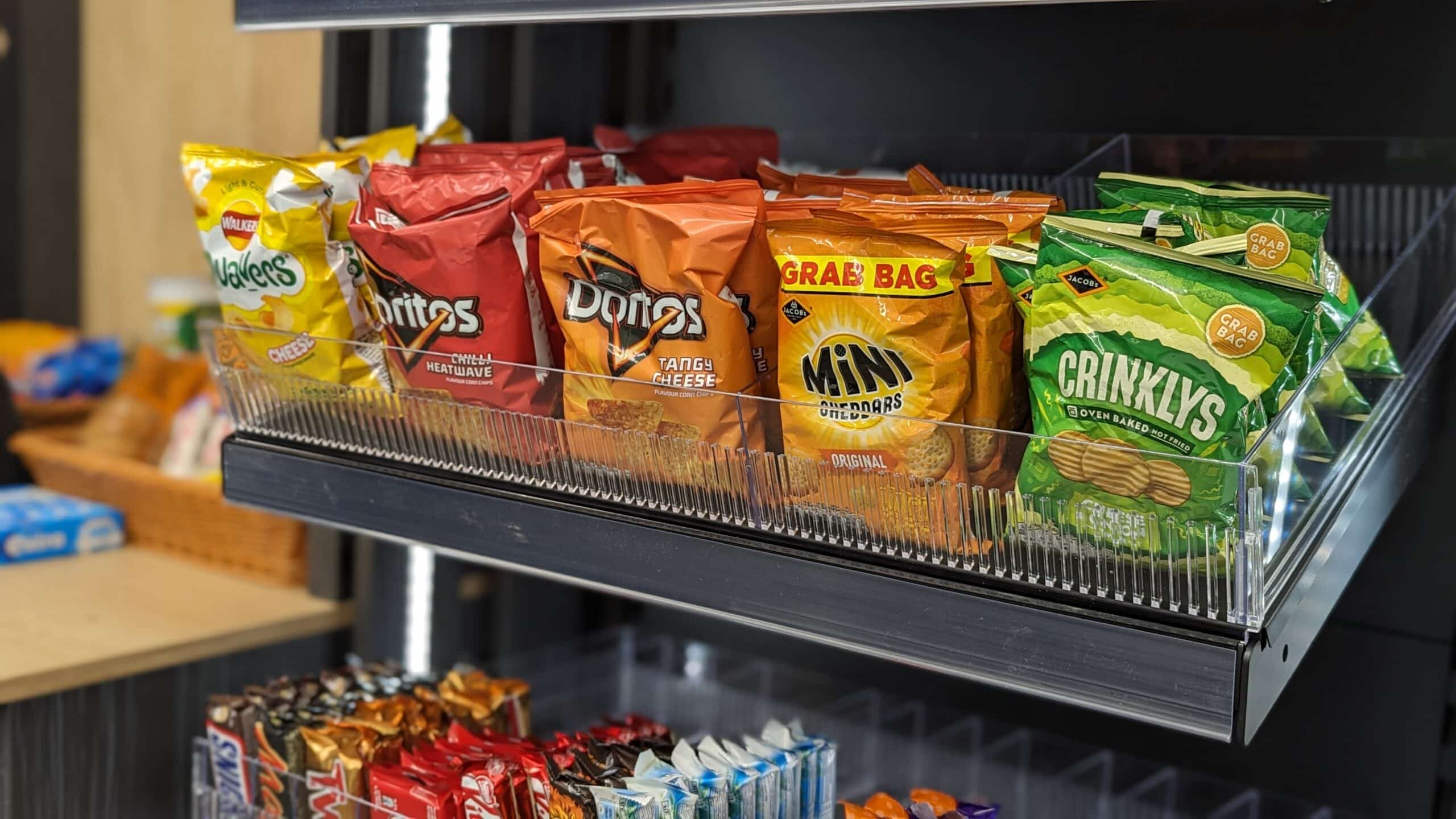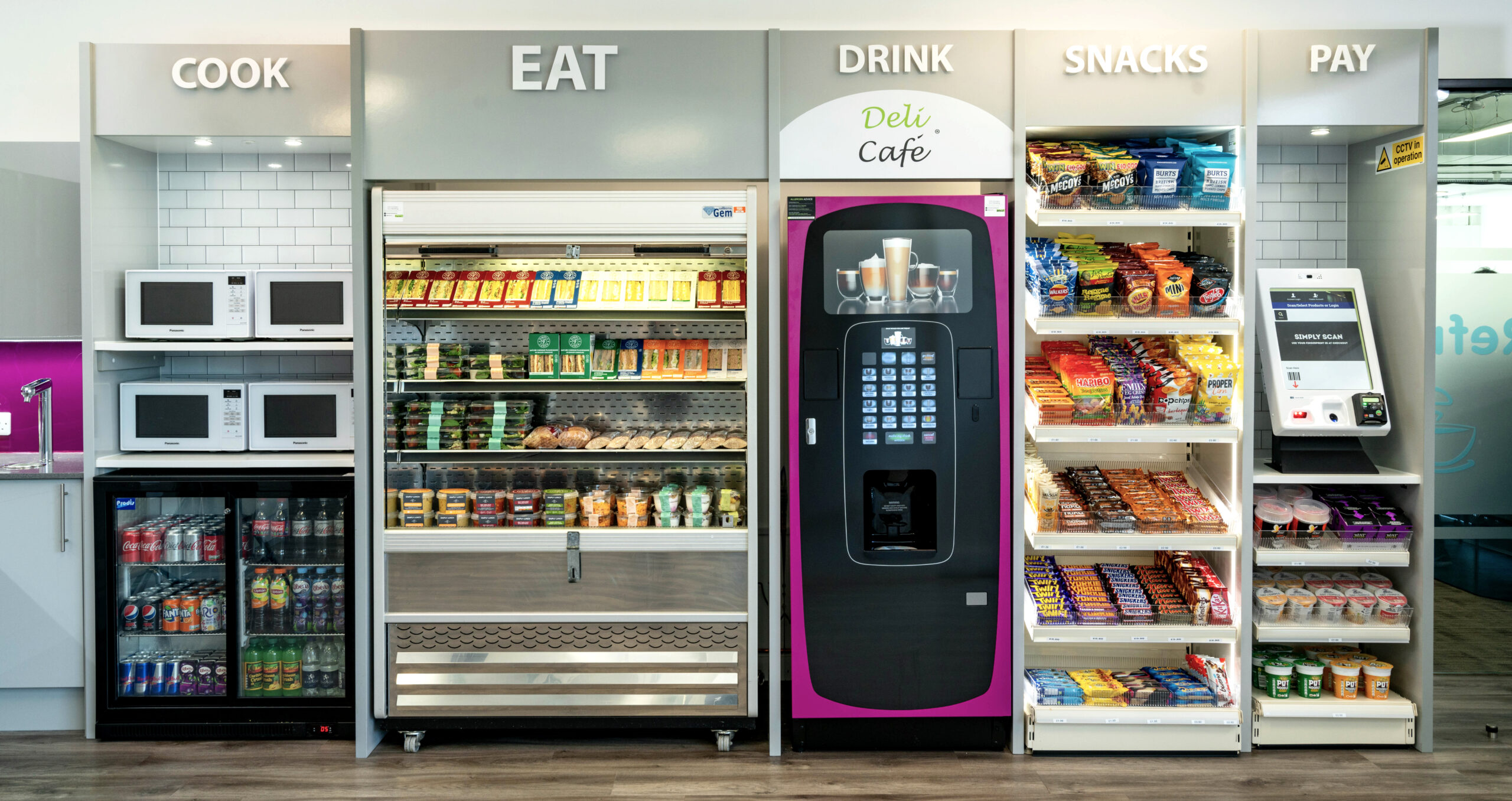WHAT IS A MICRO MARKET FOR FRESH FOOD VENDING?
The pace of change has been fast in recent years – and the expectations of employees have changed, too. Whether it’s retaining existing talent, or attracting new employees, great employee benefits go a long way. From healthy food vending machines to a card vending machine instead of cash, the market has moved on.
A micro market is a self-service food and drink kiosk that allows for a barrier-free purchase experience. Think of it like when you go to the supermarket, pick up your favourite meal deal from the shelf and then use self-checkout. Convenient, right? Just Grab, Scan and Pay.
With the latest smart technology, micro markets are revolutionising the way that consumers interact with food and drink in the workplace. No matter the size of your space or your budget, we can create a bespoke, modular micro market to suit your exact needs.

Micro Market Benefits for Fresh Food Vending and Snacks
- Micro markets are accessible 24/7, offering access for staff working unsociable hours or over weekends
- Save on manned solution costs, such as contract caterers
- Ideal for rural locations where the nearest supermarket, cafe or store is impractical to travel to
- Provide a variety of nutritious AND delicious food, 24/7
- Create a hub where employees can come together and socialise at break times
- Check out with ease, even by app with contactless vending
- Variety of options
What’s included in a Micro Market?
Whatever fits your business! A typical micro market consists of coffee vending machines, chilled fresh food fridges, frozen fridges for ready meals and ice cream, ambient bays for crisps and confectionery and cold drinks fridges.
They not only offer a more accessible and engaging alternative to contract catering and canteens, but also to conventional vending solutions such as fresh food vending machines, cold drinks machines and standalone snack vending machines.
What about food taste and quality?
The traditional perception of ‘vending’ doesn’t lend itself well to fresh, delicious food. Having been in the industry for 30 years, this is one of the common questions we’re asked.
Of course, there are options available to suit any budget. We work with a variety of quality fresh food vending suppliers, to ensure we have a diverse range of tasty options. This varies from (still mouth-watering) standard options to delectable premium offerings.
From Raynors, Ginsters and Urban Eat, to Bol, Coco Labelle, Leaf & Loaf and Tanpopo, there’s something for everyone.

INCREASE STAFF SATISFACTION WITH FULLY MANAGED MICRO MARKET VENDING
Are you ready to change the way that employees eat, drink and socialise in your workplace with outstanding employee benefits?
Convenience
Designed, built and managed by Connect Vending, self-service micro markets deliver the product variety and availability of catering, paired with the convenience and accessibility of traditional vending machines. This convenience can be pivotal on short breaks and save employees having to travel off-site for lunch.
For sites that have late shifts or employees working 24/7, micro markets are a great unmanned option to ensure food is available at all times.
Healthy Vending
In terms of healthy eating, having a micro market can encourage employees to make healthier choices.
Connect Vending analyses anonymous purchase data so that your dedicated account manager can help you stock the items that sell the best. You can even run promotions around healthier fresh food to increase sales.
Morale
Investing in a solution to make life easier, tastier and even healthier for employees is great for morale and can have a knock on effect on productivity.
Culture
Having a micro market creates a real hub for employees to gather on breaks and at times during the working day. This promotes great working relationships and promotes a collaborative culture.

Options for every meal
Breakfast, lunch, dinner and break snacking are all covered with our micro markets, with fresh food, confectionery, cold drinks and hot drinks available in our micro markets. Chilled ready meals and frozen ready meals are quickly and easily prepared and offer a more wholesome meal for times when snacks alone are not enough.
Made from high quality, sustainable materials, our bespoke micro market solutions are designed and built to meet your organisation’s specific requirements, with fresh food, hot drink, ambient and chilled storage. We can also provide a complete canteen refitting service to bring your seating and social area into alignment with your new micro market design, adding ergonomic seating, recycling stations and other fitted elements.
Contactless Vending
We work with the leading kiosk and till technology providers, including 365 Retail Markets and 3 Square Market to ensure a seamless, easy transaction process for all client sites.

Micro Market FAQs
What are vending micro markets?
Micro markets are the newest addition to the unattended retail world and a brilliant alternative to contract caterers. A micro market is a food and beverage setup, made up of refrigerated units, shelving and hot drinks machines. Most of the time, they include a self-serve till.
They allow staff, customers or visitors to grab items of fresh food, crisps, snacks, hot drinks and more without having physical barriers as traditional vending machines would, and check out by scanning products and transacting with a contactless payment method.
The concept originated in the United States in the late 2000s as a way to encourage interaction, engagement and ease of purchase. The USA now has more than 40,000 micro markets in operation.
How does a micro market work?
Micro markets are self-service solutions that allow consumers to purchase and prepare fresh food, coffee, snacks, confectionery, and cold drinks from a self-contained store.
These micro market setups come with tills or kiosks for consumers to scan and purchase products using contactless payments including credit cards, debit cards and digital wallets such as Apple Pay and Google Pay.
Grab the items you want from the micro market, scan them and pay - just like you would at the supermarket.
What size is a micro market?
The size of a micro market will be dependent on both the requirements of an organisation and the physical space available on-site. Each configuration of ambient bays, fridges, coffee machine bays and tills will be different and reflect the needs of an organisation’s workforce. For example, if coffee is in high demand in a particular office environment, it may be appropriate to install multiple floor standing coffee machines in the housing, whereas in an environment with less demand for coffee, a single tabletop machine might do the job.
Our team of experts can assist you throughout the entire process, from the beginning to the installation and provide continuous management. Get in touch to arrange an exploratory call, or to find out more about the various configurations available.
What sort of food and drink items can be stocked in a micro market?
Micro markets are a super flexible option, offering a huge variety of fresh and packaged food and drinks. Micro markets can house fresh food like salads and sandwiches in refrigerators as well as offering hot drinks, cold drinks, confectionery and other ambient snacks. Micro markets can also provide a healthier selection including fresh fruit and special vegan and gluten free options.
How do you maintain hygiene levels when there are many customer touchpoints?
Maintaining hygiene levels at our micro market kiosks are a top priority for us. We understand the concerns related to customer touchpoints and have implemented a comprehensive approach to ensure a clean and safe environment for all users.
How can micro market theft be prevented?
Micro markets are unstaffed, which can often give business owners the wrong impression that products are at an increased risk of theft. However, we find that the levels of theft from micro markets are extremely low and find that end-users find the self-checkout process familiar.
It is possible to install security camera systems, should you be particularly concerned about the risk of theft. Our micro markets are managed using market-leading back office tools, meaning we can alert you of any discrepancies in inventory that may be as a result of theft.
Where can you put a micro market?
You can theoretically place a micro market in any setting, provided it’s the right solution for the workforce and there’s a location that would be appropriate. If a business has fewer than 100 employees, a micro market may not be the right solution, and traditional vending may be a better choice.
The ideal location for a micro market kiosk is a breakroom or communal space which is easily accessible from all areas of a facility or office. This provides workers with the easiest access from anywhere on the premises and provides enough floorspace to install the various elements of a micro market vending setup.
Are micro markets only suitable for larger workspaces?
Micro markets are a versatile and adaptable solution that can benefit workplace of varying sizes. While they are often associated with larger workplaces, they can also be successfully implemented in smaller settings. Micro market vending solutions would be beneficial for smaller workplaces in rural locations who have limited access to supermarkets, cafes, or stores.
My employees have dietary requirements, do you have options to cater for this?
Plenty! Whether you need to provide options for vegetarians and vegans, kosher or halal. Our range extends from sandwiches and wraps to pasta, salads and even curry. We're all about variety!
SPEAK TO OUR SALES TEAM
If you're looking to revolutionise your workplace food and drink with a micro market solution, our friendly sales team are here to help. Drop us a message to arrange a callback, or for more information!
"*" indicates required fields


